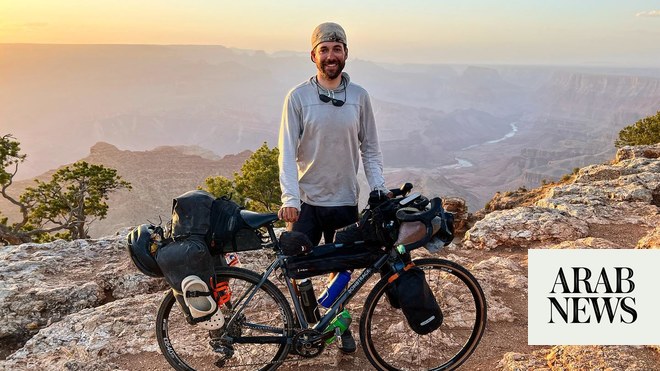
A Lebanese-American’s 25,000 km journey from Boston to the southernmost tip of South America
DUBAI: In April 2023, Samer Abouhamad made it to Ushuaia, a small town in Argentina, nicknamed “the end of the world” because of its position on the southernmost tip of South America.
For the latest updates, follow us on Instagram @arabnews.lifestyle
His journey started in the US a year earlier … on a bike.
Abouhamad’s spiritual path, of sorts, however, started three years ago. He was working remotely in the US, and when COVID-19 hit, moved to his homeland, Lebanon, to be with family.
His father, who likes cycling, motivated him “to get out of the house,” which was “awesome,” Abouhamad told Arab News from Buenos Aires, days after he completed his year-long trip.
After arriving back in Lebanon amid the pandemic, Abouhamad discovered his country by bike.
“I’ve always been Lebanese, but I never really got to discover the country on my own terms,” he said.
“That was an awesome experience — almost spiritual. And I was hooked.”
The following year he took part in his first cycling trip: A 10-day tour of France with no professional training.
He built his physical strength and endurance while volunteering at a nonprofit in Beirut, where he spent four days a week doing manual construction labor and cycling during his free time.
Abouhamad pondered what to do next. He read a book by English author Alastair Humphreys, who chronicled his adventures cycling the world for more than four years.
“It just made me realize if someone could do this kind of trip back then (2011); it’s so much more accessible now with all the resources,” Abouhamad said.
He started working on getting the right equipment and returned his home in Boston in early 2022. In April last year, he cycled coast to coast to Los Angeles, then on to San Diego, and across the border to Mexico, covering a total of 14 countries and more than 25,000 kilometers in the next year.
Abouhamad had to decide which cities to cycle to every week and when to stop to refuel, but for the most part, he “just went with the flow.”
He said: “I think it’s hard to fully plan a trip like this too far in advance because things are just going to change along the way, and so the way I thought of it was I would just take it day by day.”
Online resources were a massive help for Abouhamad, for everything from route planning to finding places to sleep for the night.
“I don’t get how people did it 20-30 years ago. There are so many resources today, so I never had to worry really,” he added.
He would stop at restaurants to eat but would also buy food that could be cooked easily. He also carried snacks to get him through the day. Simple items like granola, oatmeal and even bread were a staple — because “when you’re cycling, everything tastes good,” he said with a laugh.
Abouhamad traveled solo for most of his trip, but along the way met fellow cyclists with whom he would spend a few days.
Although he likes traveling with others, he said that there are pros and cons to both solo and group travel. “It’s nice to share moments together (with others) but there’s a certain freedom to traveling solo, which is pretty liberating.”
That freedom also comes with many highs and lows. A trip like Abouhamad’s requires not only physical strength, but also mental strength and resilience.
“Even each day, the highs are so high and the lows so low,” he said.
There were times when he would lack the energy to cycle the next day, but daily moments reminded him of how much he loved what he was doing.
Abouhamad has led a relatively easy life, free of any major adversity or struggle, he said. And so, cycling became his own personal struggle in some way. Going to bed every night — whether it was in a tent or a bed and breakfast — exhausted from the struggle of the day, brought him a certain kind of happiness.
“You put your head down and you just sleep right away,” he said. It is the kind of tired that comes from “using your body instead of being tired from looking at your screen or Excel.”
Moreover, he said, “bikepacking” is only half about biking; the other half is about adapting to problems you face on the road. Although his life was never at risk, he faced all kinds of challenges, from bad weather to broken gear.
In Peru, for example, there were nationwide protests taking place as Abouhamad passed through the country.
Especially from the city of Cusco to the Bolivian border, there were checkpoints every 10 to 15 kilometers and cars were forbidden from passing. However, cyclists would have to stop and explain themselves to authorities. Sometimes, they were even asked to lead a chant before they could pass through.
“It was tiring in the moment, but it’s a good memory,” he said.
As he reflects on this last year, it is hard for Abouhamad to crystallize the best parts of his trip, but if he had to, he would pick the mountains in Peru for their beauty; Mexico for its food; and Argentina and Colombia for its people.
For the past year, Abouhamad’s identity has been his bike. “I got so used to the freedom of just waking up every day and hopping on my bike and being outside,” he said. But now, while he is excited to get back and see his friends and family, he is also questioning his identity.
One thing he knows for sure is that this is not the end. “The hardest part of my trip was starting it,” he said. “Telling people, quitting your job, and then actually doing it … that’s the hardest part.”
Abouhamad is already planning his next cycling trip. In August, he will travel to South Africa and ride to Lebanon. From there, he will either ride to Norway or to some part of Asia.
His idea of biking from South Africa to Norway — or “cape to cape” as he calls it — sounds poetic, if a little daunting. In reality, it is only 18,000 kilometers compared to the 25,000 kilometers he rode during his American trip, so “in theory, I could do it in a year,” he said.
In the short term, Abouhamad is trying to find ways to share more about his trip. “I’d love to find a way to inspire other people to go out there and go on a trip like this, too,” he said.












